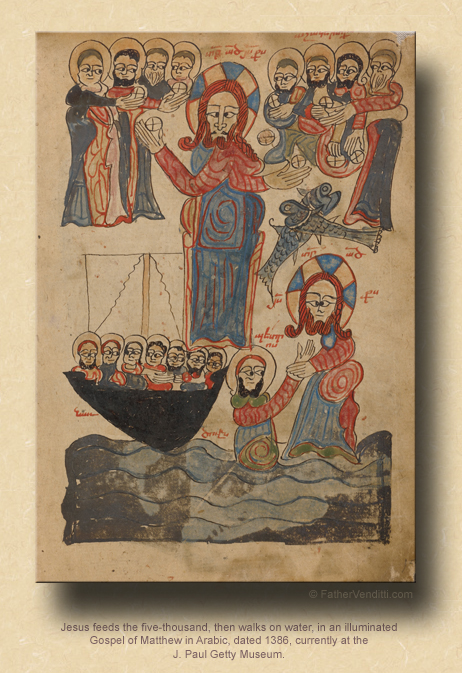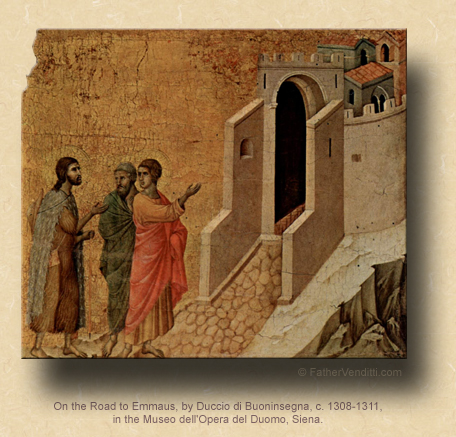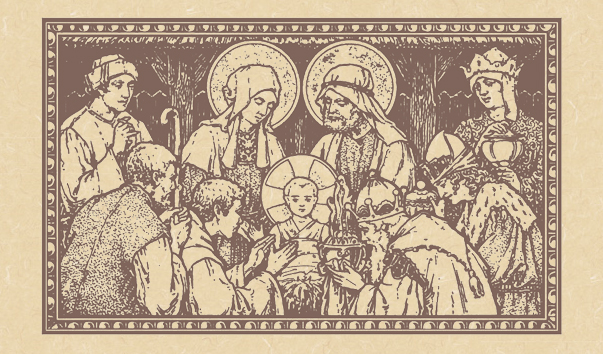Christ is Passing By.
The Wednesday after Epiphany; or, the Memorial of Saint André Bessette, Religious.
Lessons from the feria, according to the ordinary form of the Roman Rite:
• I John 4: 11-18.
• Psalm 72: 1-2, 10, 12-13.
• Mark 6: 45-52.
|
Outside the United States & wherever the Epiphany is observed on January 6th:
The Solemnity of the Epiphany of the Lord.
Lessons from the proper, according to the ordinary form of the Roman Rite:
• Isaiah 60: 1-6.
• Psalm 72: 1-2, 7-8, 10-13.
• Ephesians 3: 2-3, 5-6.
• Matthew 2: 1-12.
|
The First Class Feast of the Epiphany of Our Lord.
Lessons from the proper, according to the extraordinary form of the Roman Rite:
• Isaiah 60: 1-6.
• Isaiah 60: 6, 1 (in place of the psalm).
• Matthew 2: 1-12.
The Solemn Holy Day of the Theophany of Our Lord, God & Savior, Jesus Christ.*
Lessons from the menaion, according to the Ruthenian recension of the Byzantine Rite:
[At the Vigil Divine Liturgy of Saint Basil.]
• Genesis 1: 1-13.
• Exodus 14: 15-18, 21-23, 27-29.
• Exodus 15: 22--16: 1.
• Joshua 3: 7-8, 15-17.
• II (IV) Kings 2: 6-14.
• II (IV) Kings 5: 9-14.
• Isaiah 1: 16-20.
• Genesis 32: 1-10.
• Exodus 2: 5-10.
• Judges 6: 36-40.
• I (III) Kings 18: 30-39.
• II (IV) Kings 2: 19-22.
• Isaiah 49: 8-15.
• I Corinthians 9: 19-27.
• Luke 3: 1-18.
[At the Divine Liturgy of Saint John Chrysostom.]
• Titus 2: 11-14.
• Matthew 3: 13-17.
[At the Great Blessing of Water.]**
• Isaiah 35: 1-10.
• Isaiah 55: 1-13.
• Isaiah 12: 3-6.
• I Corinthians 10: 1-4.
• Mark 1: 9-11.
FatherVenditti.com
|
 8:38 AM 1/6/2016 — Of all the Gospels, Saint Mark's is, in many ways, the most mysterious. First of all, it's the shortest, which lead many Scripture scholars in the last century to presume that it was the most primitive, an assertion only clung to now by those who have never read the Fathers of the Church, who tell us quite clearly that Matthew's Gospel was written first. Of the four, Matthew, Mark and John include this account of our Lord walking on the sea;—we don't know why Saint Luke does not include it—and of those three, only Saint Matthew includes the episode of Peter getting out of the boat and trying to walk on the sea as well, and having to be saved by our Lord, followed by his confession of faith. 8:38 AM 1/6/2016 — Of all the Gospels, Saint Mark's is, in many ways, the most mysterious. First of all, it's the shortest, which lead many Scripture scholars in the last century to presume that it was the most primitive, an assertion only clung to now by those who have never read the Fathers of the Church, who tell us quite clearly that Matthew's Gospel was written first. Of the four, Matthew, Mark and John include this account of our Lord walking on the sea;—we don't know why Saint Luke does not include it—and of those three, only Saint Matthew includes the episode of Peter getting out of the boat and trying to walk on the sea as well, and having to be saved by our Lord, followed by his confession of faith.
But Mark's Gospel is mysterious on a number of levels: he employs a lot of Old Testament symbolism but without quoting the citations the way Matthew and Luke do. For example, the Evangelist mentions—and Mark is the only one of the three who does—that Jesus “came to them, walking on the sea, and made as if to pass them by” (6: 48 Knox). Why would his initial intention be to pass them by? And every commentary you can find on this passage says the same thing: that this is baffling.
Well, it's not, really. This Gospel lesson is being read to us this year on the day of Epiphany according to the universal calendar of the Church where it is not transferred to a Sunday, and this notion of God “passing by” is part of the “Epiphany language” of the Old Testament, where it is a testimony of God's presence. God's first meeting with Moses after only hearing His voice from the burning bush: “The Lord came down to meet him, hidden in cloud, and Moses stood with him there, calling on the Lord’s name. Thus the Lord passed by, and he cried out, 'It is the Lord God'” (Exodus 34: 5-6 Knox).*** God's initial contact with Elijah: “Then word came to him to go out and stand there in the Lord’s presence; the Lord God himself would pass by” (I Kings 19: 11 Knox). And, this whole incident was prophesied by Job when he described his initial contact with God: “He it was, and no other, that spread out heaven to be his covering, made [the] ocean a floor under his feet.… Hidden from my sight, hidden from my thought, he comes and goes [he passes by.]” (Job 9: 8, 11 Knox).
The word “Epiphany” means “manifestation.” The feast is not simply a commemoration of the visit of the Magi;—that wouldn't warrant a feast of this importance—it's a commemoration of the Divinity of Christ. And, just as He was wont to do in the Old Testament, so God, in the person of Jesus, initially reveals Himself to those who would ultimately believe in Him by subtly passing by. In Luke, chapter 18: “When he came near Jericho, there was a blind man sitting there by the way-side begging. And he, hearing a multitude passing by, asked what it meant; so they told him, that Jesus of Nazareth was going past” (vs. 35-37 Knox). In chapter 19: “He had entered Jericho, and was passing through it; and here a rich man named Zacchaeus, the chief publican, was trying to distinguish which was Jesus, but could not do so because of the multitude, being a man of small stature. So he ran on in front, and climbed up into a sycamore tree, to catch sight of him, since he must needs pass that way” (vs. 1-4 Knox). And how many other countless encounters that all begin the same way: with our Blessed Lord “passing by.”
Why does God do this? Why isn't He more direct? Why does He first reveal Himself in such a subtle way? When Elijah was told that God would be passing by, and went out to meet Him, he looked everywhere he thought God might be: he didn't find God in the mountain, he didn't find God in the earthquake, he didn't find God in the fire; he almost missed Him, finding Him where he would never have thought to look: in “the whisper of a gentle breeze” (I Kings 19: 12 Knox). Why?  And the answer, which has enormous import for our own interior life, might be found at the very end of our Lord's time on earth, in an event recorded only by Luke. It happens after our Lord had risen from the dead, but had not yet revealed Himself to His Apostles. Two of his disciples, who are unnamed, are walking along the road to the village of Emmaus, and encounter our Lord, but do not recognize Him in His glorified body; and, at the end of the journey, the Evangelist tells us: “And now they were drawing near the village to which they were walking, and he made as if to go on further; but they pressed him, 'Stay with us...'” (24: 28-29 Knox). By making as if to part from them and continue along on His own, our Lord puts the burden of action on them: if they want Him to stay on with them, they have to ask Him. And the answer, which has enormous import for our own interior life, might be found at the very end of our Lord's time on earth, in an event recorded only by Luke. It happens after our Lord had risen from the dead, but had not yet revealed Himself to His Apostles. Two of his disciples, who are unnamed, are walking along the road to the village of Emmaus, and encounter our Lord, but do not recognize Him in His glorified body; and, at the end of the journey, the Evangelist tells us: “And now they were drawing near the village to which they were walking, and he made as if to go on further; but they pressed him, 'Stay with us...'” (24: 28-29 Knox). By making as if to part from them and continue along on His own, our Lord puts the burden of action on them: if they want Him to stay on with them, they have to ask Him.
Today's Gospel lessons ends on a sobering note: the miraculous appearance of Jesus walking on the sea is clearly meant to be an Epiphany. With his climbing aboard the boat, the gale dies away, and the disciples are dumbstruck. Saint Mark tells us in the last verse that they were just as clueless in the event immediately preceding this, which we heard yesterday: the multiplication of the loaves. Everyone, it seems, is looking for God like Elijah: in the mountain, in the earthquake, in the fire, in some sort of big, bombastic manifestation; never in the whisper of a gentle breeze. Just like we are constantly begging God to to give us easy sign-posts on the road of life, so that we don't have to attune ourselves through prayer and penance and mortification to hear the voice of God in the subtlety of the interior life. So often a priest meets souls in confession who are there after many years away because suddenly they find themselves in some desperate situation: they've been diagnosed with cancer, or the marriage is falling apart, or they've lost their job, or whatever. They want God to show them the way. They don't understand that they must first give up the fornication, the greed, the spiritual neglect. God only speaks to those who live the life He has commanded us to live, and then only in a whisper.
For those of us striving—albeit imperfectly—to live the life of Grace, we must always pay attention, because in any moment of our lives, in any situation in which we may find ourselves, or in any soul we may meet along the way, Christ is passing by.

* The Churches of the Byzantine Tradition do not commemorate the visit of the Magi liturgically; thus, this feast only corresponds in part to the Epiphany in the Latin Church, but more precisely corresponds to the Feast of the Baptism of the Lord in the ordinary form. Cf. the second footnote appended to the post of 1-3-2016 (the Solemnity of the Epiphany) for a detailed breakdown of how these events are commemorated in the three liturgical traditions featured on this site.
** In the Ruthenian recension, water is traditionally blessed twice on Theophany. The first blessing, taking place following the Vigil Divine Liturgy of Saint Basil, is of the "Jordan Water" which is kept in church and used for baptisms. The second, the "Great Blessing of Water," takes place following the Divine Liturgy of Saint John Chrysostom, usually at the local river or other natural body of water, with the faithful then collecting the water from that source to take to their homes. The Typicon of the Ruthenian Metropolia of the USA, however, indicates that water may be blessed "whenever the faithful can best attend," using the formula of the Great Blessing of Water. When this is done in church following the Divine Liturgy, it replaces the blessing of the Jordan Water per se, and the lessons indicated for this service are usually omitted; this water is then distributed to the faithful.
*** Note that Msgr. Knox never employs quotation marks in his translation, but rather simply sets off direct statements made by principles by capitalizing the first word of the quote; so, whenever citing passages that contain direct quotations, I add the punctuation for the sake of clarity.
|

